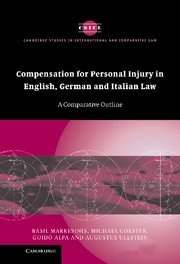Book contents
- Frontmatter
- Contents
- Foreword
- Preface
- Table of cases
- List of Abbreviations
- 1 Introduction
- 2 General damages: non-pecuniary losses
- 3 Special damages: past losses
- 4 Future pecuniary losses
- 5 Collateral sources of revenue: subrogation rights and miscellaneous matters
- 6 Conclusions
- Appendix: Comparative tables on the evaluation of physical injury (IP) for micro-permanent injuries
- Index
- CAMBRIDGE STUDIES IN INTERNATIONAL AND COMPARATIVE LAW
4 - Future pecuniary losses
Published online by Cambridge University Press: 02 July 2009
- Frontmatter
- Contents
- Foreword
- Preface
- Table of cases
- List of Abbreviations
- 1 Introduction
- 2 General damages: non-pecuniary losses
- 3 Special damages: past losses
- 4 Future pecuniary losses
- 5 Collateral sources of revenue: subrogation rights and miscellaneous matters
- 6 Conclusions
- Appendix: Comparative tables on the evaluation of physical injury (IP) for micro-permanent injuries
- Index
- CAMBRIDGE STUDIES IN INTERNATIONAL AND COMPARATIVE LAW
Summary
English law
Introduction
In addition to general damages for pain, suffering and loss of amenity an injured individual will be compensated for pecuniary loss suffered by him as a direct consequence of his injuries and residual disabilities. The various heads of loss are considered later in this chapter. In essence they fall into two categories; monies which the claimant would have received but for the accident, and expenditure which he would not have incurred but for the accident. The court, inevitably, is involved in a degree of speculation. It is incumbent upon the claimant to prove, on the balance of probabilities, what would have happened in the future or what is likely to have happened in the future. The court considers the position as it is at the date of trial and makes its assessment at that date. Save in one exceptional case neither side has the opportunity to return to court to review the level of damages. Once the damages are paid it is entirely a matter for the claimant how the money is spent. The defendant is not entitled to insist that the money be used for any specific purpose nor is he entitled to return to court to complain that the claimant has not, in fact, done what he said he was going to do in the course of the evidence.
- Type
- Chapter
- Information
- Compensation for Personal Injury in English, German and Italian LawA Comparative Outline, pp. 116 - 170Publisher: Cambridge University PressPrint publication year: 2005



